Charles E W Bean, Diaries, AWM38 3DRL 606/142/1 - September 1916 - Part 2
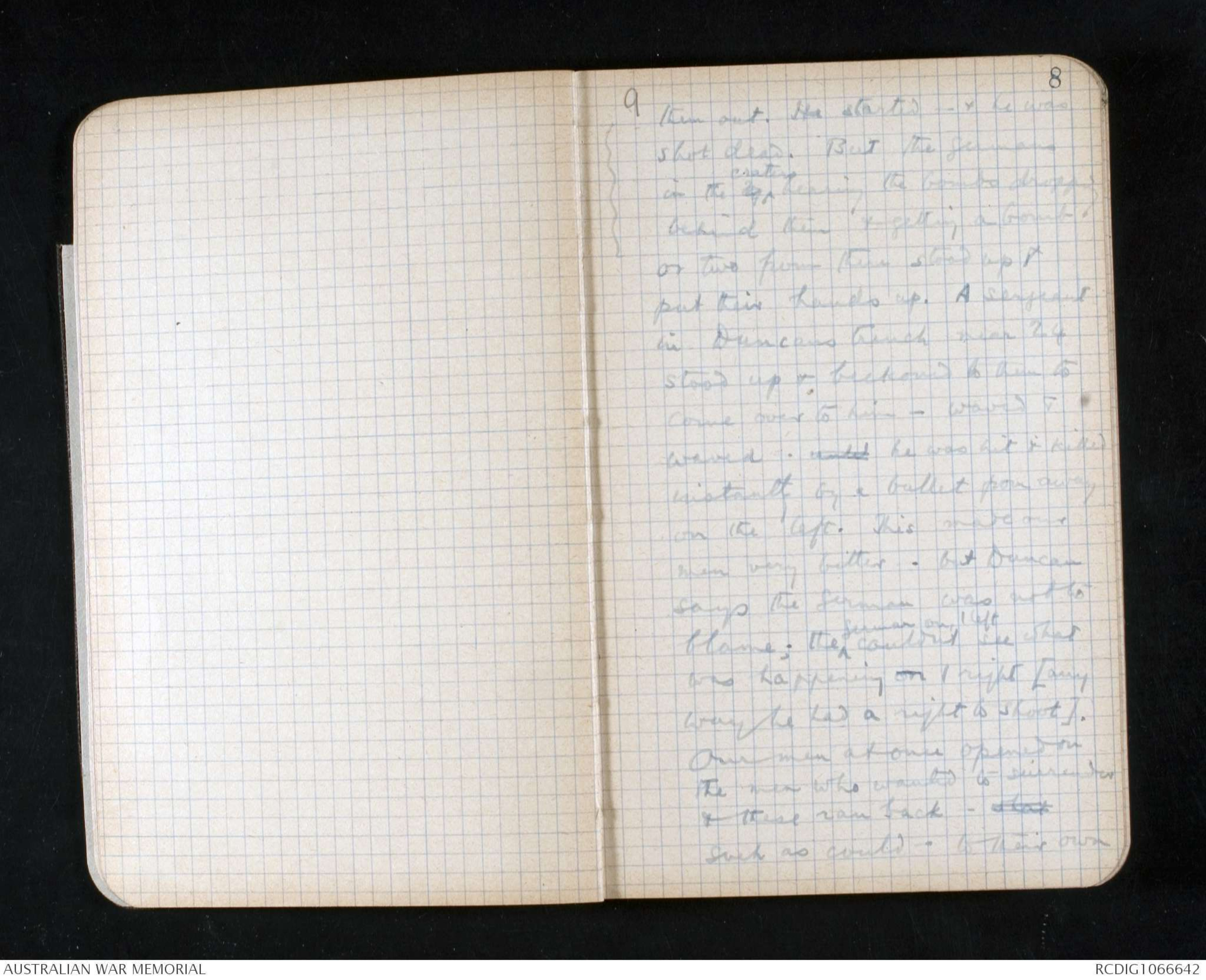
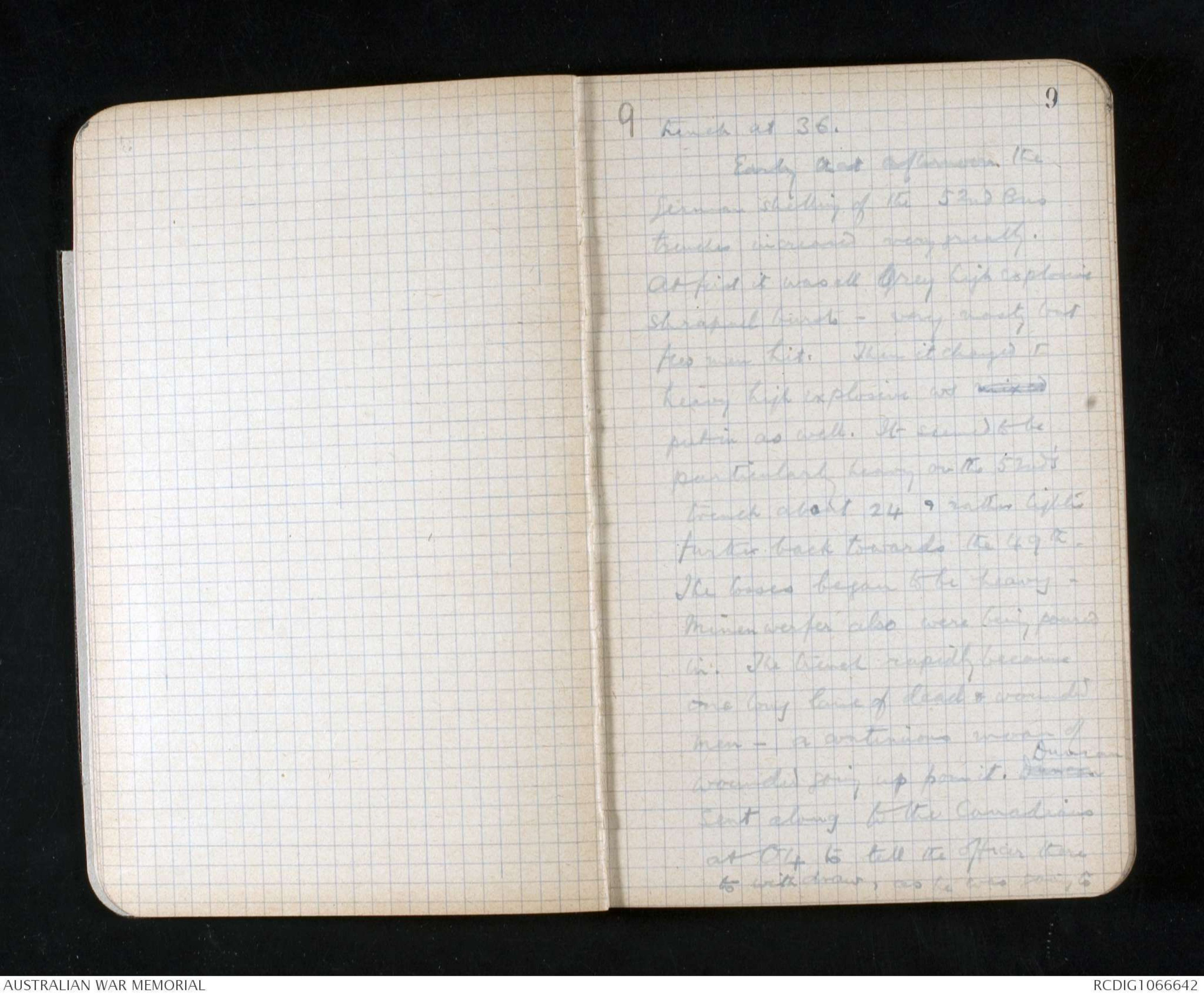
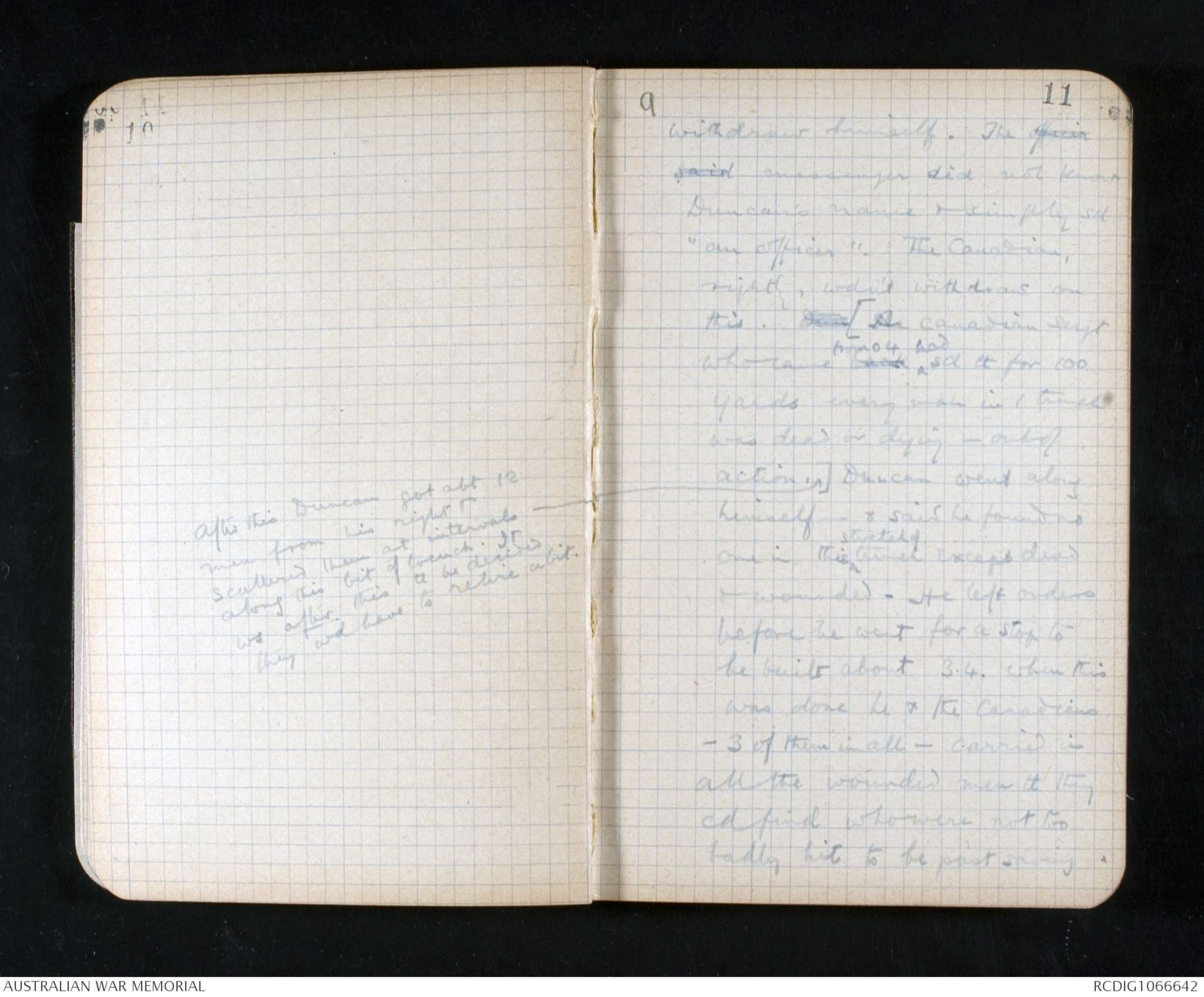
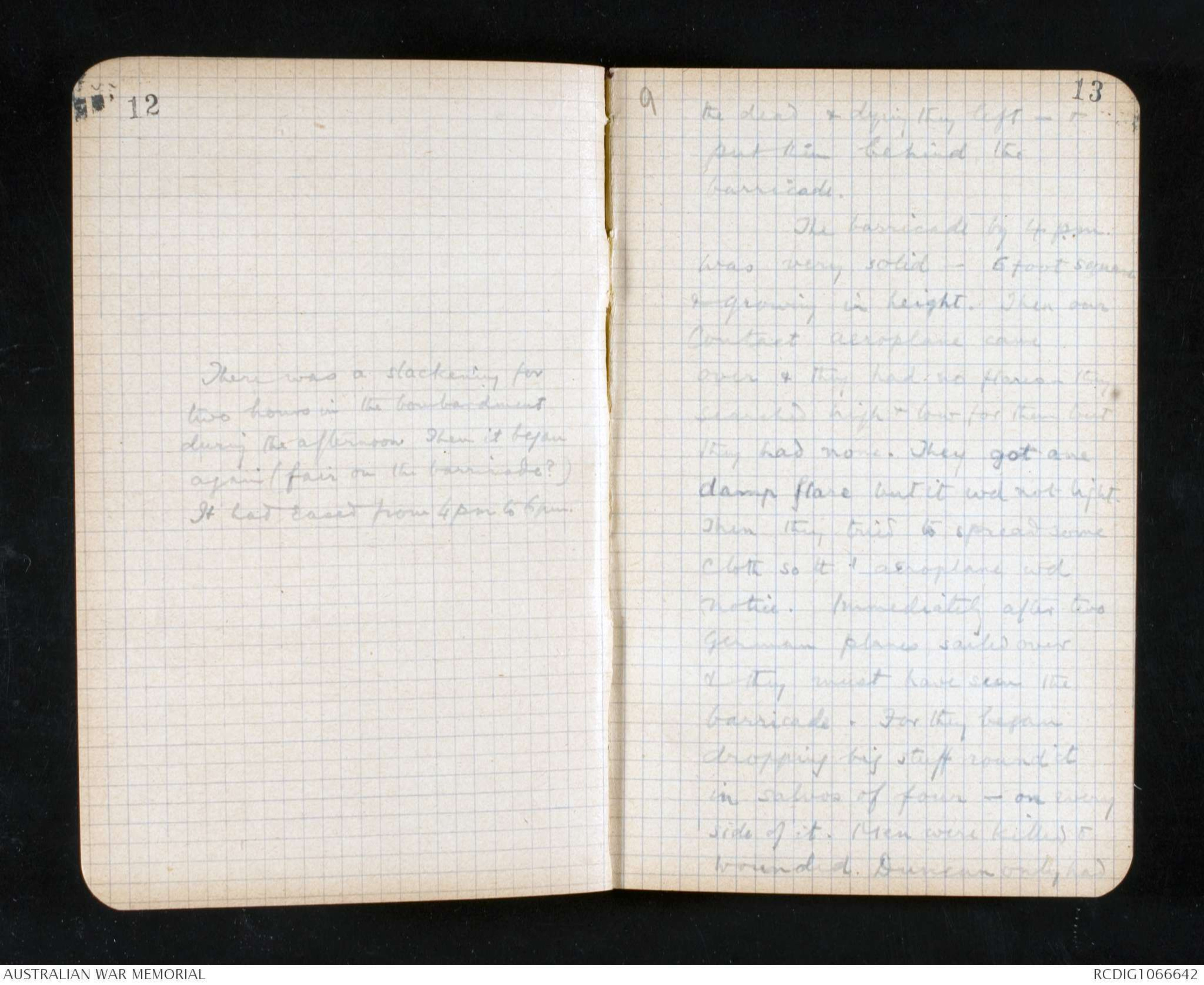
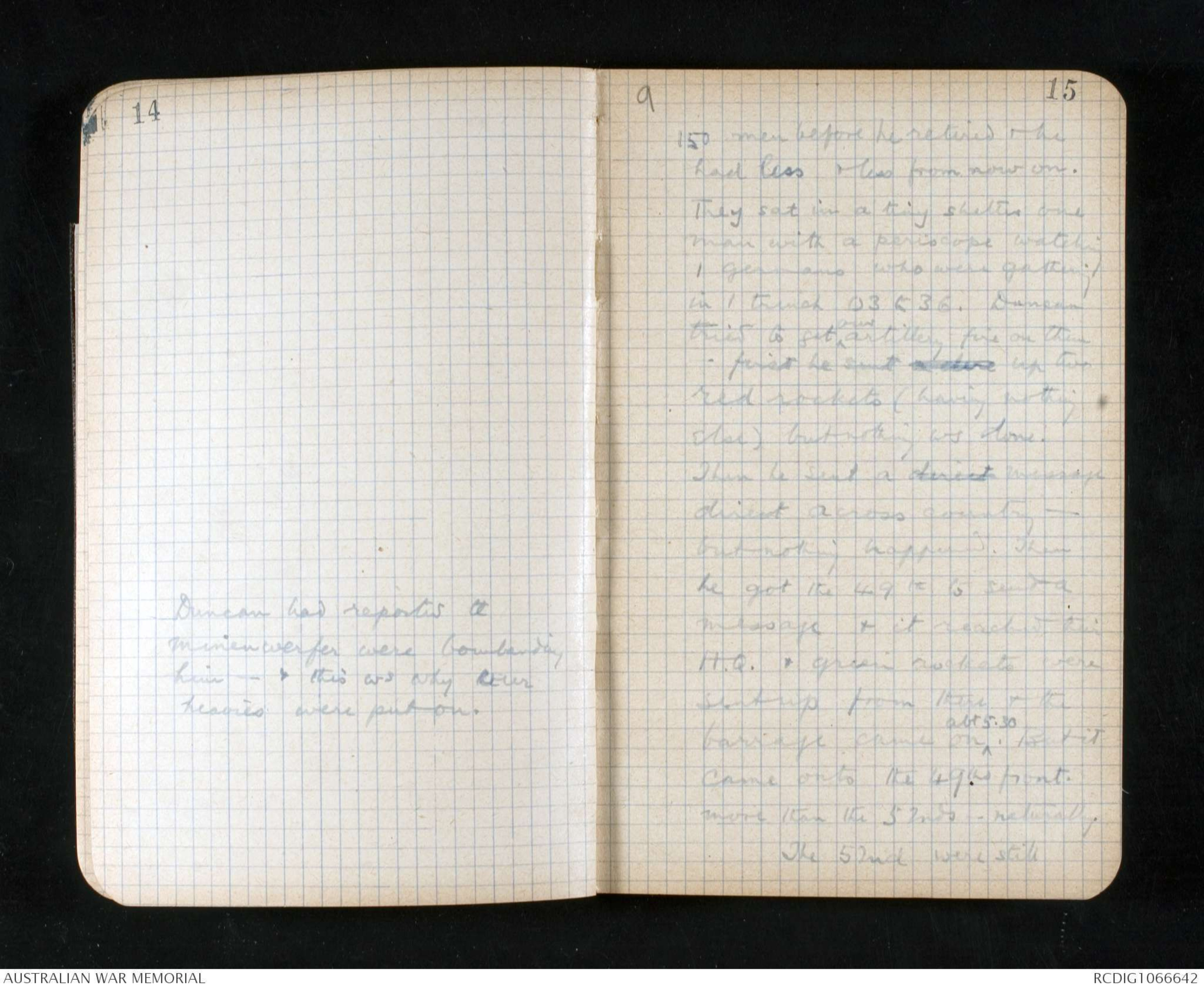
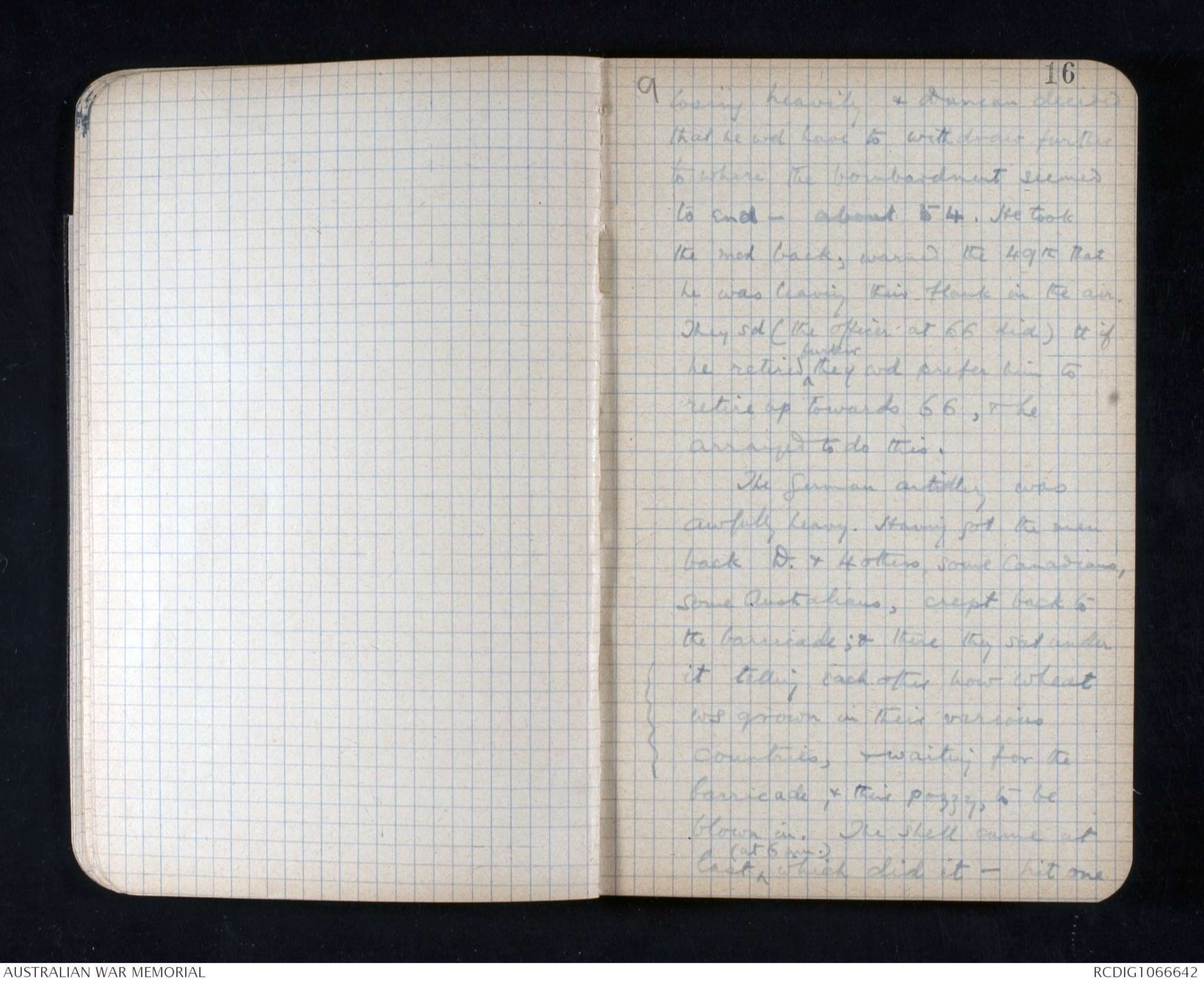
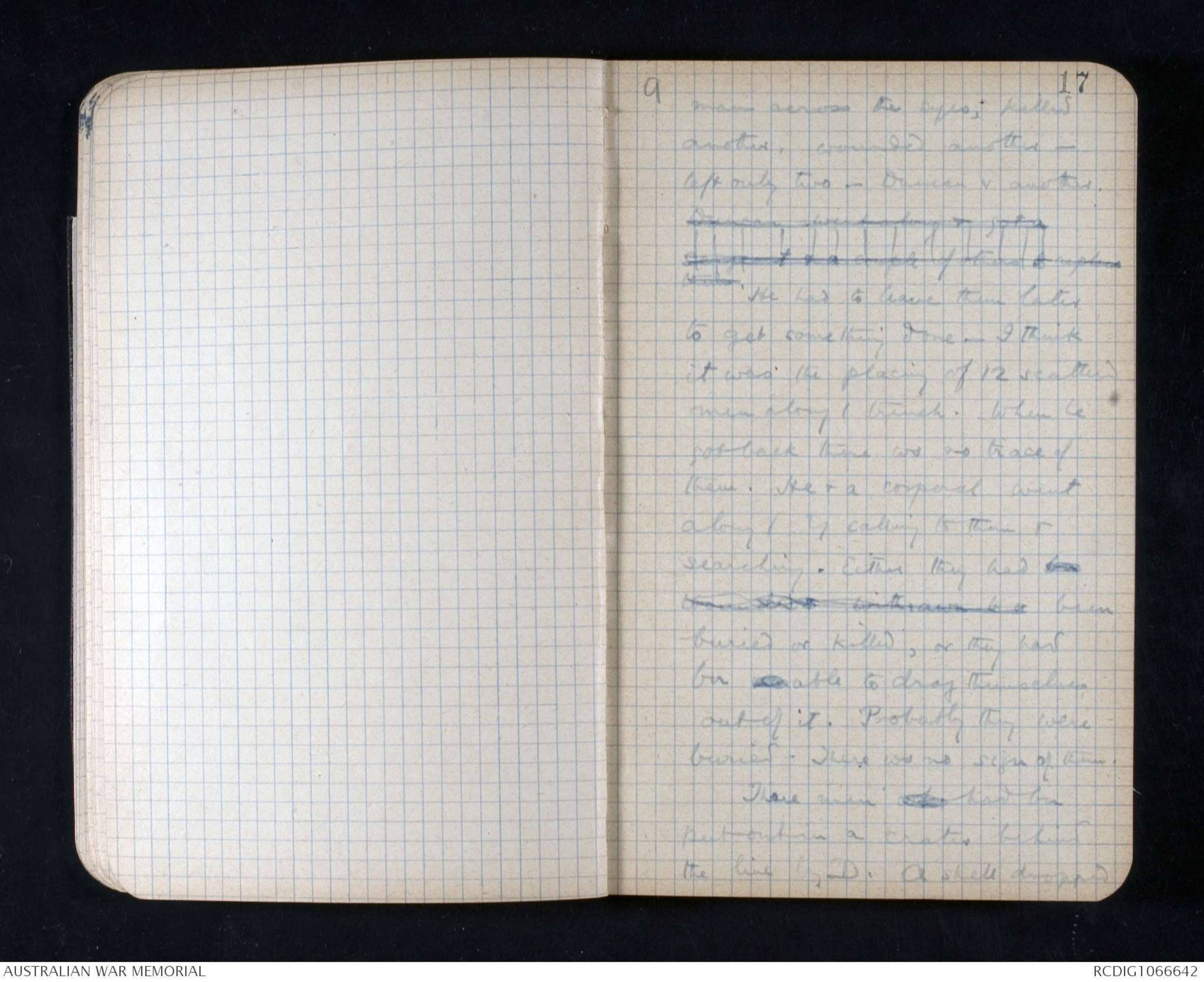
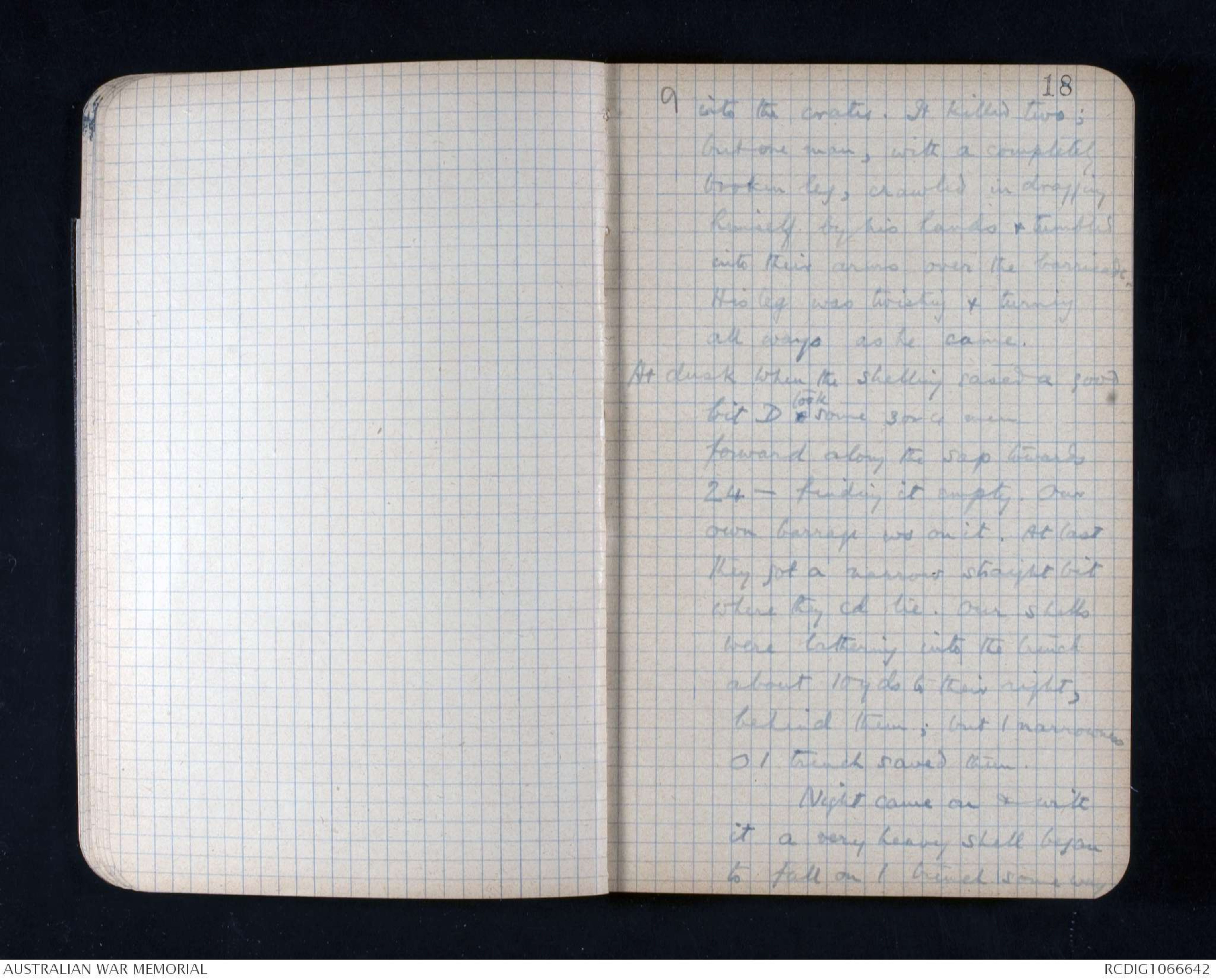
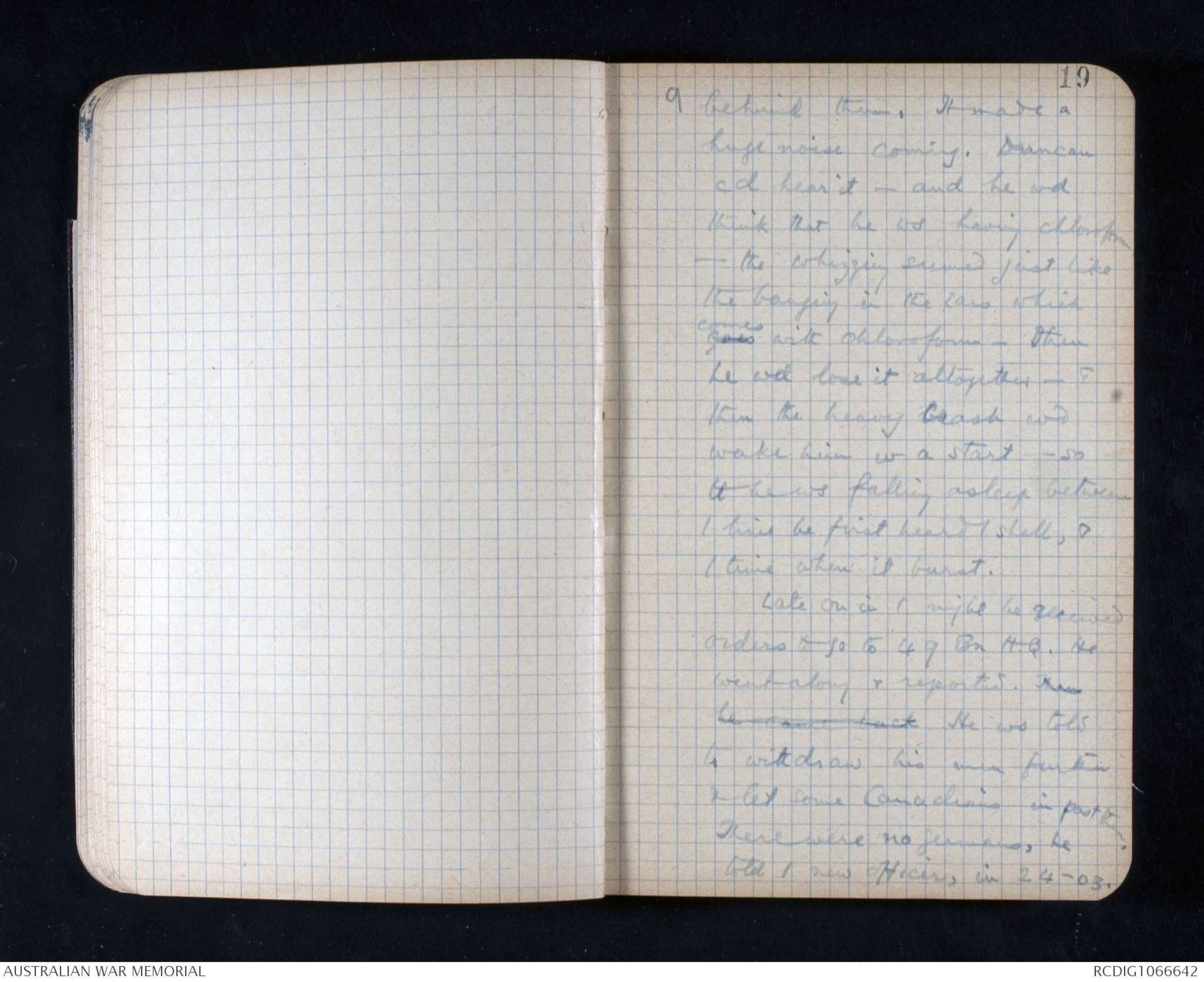
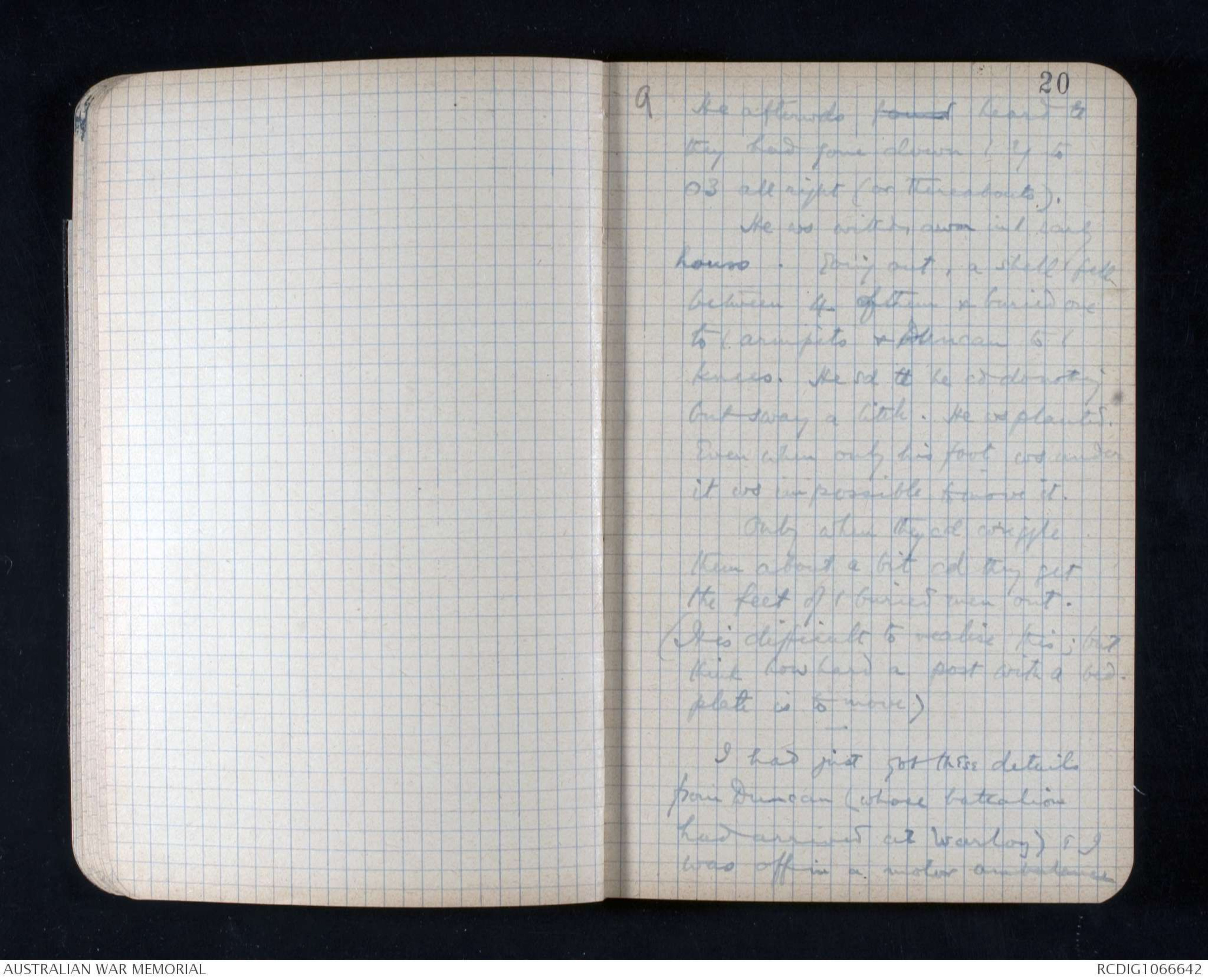
9
8
them out. He started - & he was
shot dead. But the Germans
in the trench ^ craters hearing the bombs dropping
behind them & getting a bomb
or two from there stood up &
put their hands up. A sergeant
in Duncans trench near 24
stood up & beckoned to him to
come over to him - waved &
waved. until he was hit & killed
instantly by a bullet from away
on the left. This made our
men very bitter – but Duncan
says the German was not to
blame; the ^ German on / left couldn't see what
was happening on / right [any
way he had a right to shoot].
Our men at once opened on
the men who wanted to surrender
& these ran back – what
such as could – to their own
9
9
trench at 36.
Early that afternoon the
German shelling of the 52nd Bns
trenches increased very greatly.
At first it was all Grey high explosive
shrapnel bursts – very nasty but
few men hit. Then it changed to
heavy high explosive ws mixed
put in as well. It seemed to be
particularly heavy on the 52nd's
trench about 24 & rather lighter
further back towards the 49th.
The losses began to be heavy &
Minenwerfer also were being poured
in. The trench rapidly became
one long lane of dead & wounded
men – a continuous moan of
wounded going up from it. Duxxxn Duncan
sent along to the Canadians
at O 4 to tell the officer there
to withdraw, as he was going to
10
9
11
withdraw himself. The officer
said messenger did not know
Duncan's name & simply sd
"an officer". The Canadian,
rightly, wdn't withdraw on
this. Dun [ThA Canadian sergt
who came back ^ from 04 had sd tt for 100
yards every man in / trench
was dead or dying – out of
action. ^ ]
[*After this Duncan got abt 12
men from his right &
scattered them at intervals
along this bit of trench. It
ws after this tt he decided
they wd have to retire a bit.*]
Duncan went along
himself — & said he found no
one in this ^ stretch of trench except dead
and wounded – He left orders
before he went for a stop to
be built about 3.4. When this
was done he & the Canadians
– 3 of them in all – carried in
all the wounded men tt they
cd find who were not too
badly hit to be past saving.
12
There was a slackening for
two hours in the bombardment
during the afternoon. Then it began
again (fair on the barricade?)
It had eased from 4 pm to 6 pm.
9
13
the dead & the dying they left - &
put them behind the
barricade.
The barricade by 4 p.m.
was very solid - 6 foot square
& growing in height. Then our
Contact aeroplane came
over & they had no flares – they
searched high & low for them but
they had none. They got one
damp flare but it wd not light.
Then they tried to spread some
cloth so tt / aeroplane wd
notice. Immediately after two
German planes sailed over
& they must have seen the
barricade. For they began
dropping big stuff round it
in salvos of four - on every
side of it. Men were killed &
wounded. Duncan only had
14
Duncan had reported tt
Minenwerfer were bombarding
him — & this was why our
heavies were put on.
9
15
150 men before he retired & he
had less & less from now on.
They sat in a tiny shelter one
man with a periscope watching
/ Germans who were getting
in / trench 03 to 36. Duncan
tried to get ^ our artillery fire on them
- first he sent a dire up two
red rockets (having nothing
else) but nothing ws done.
The he sent a direct message
direct across country -
but nothing happened. Then
he got the 49th to send the
message & it reached their
H.Q. & green rockets were
sent up from there & the
barrage came on ^ abt 5.30. But it
came onto the 49ths front.
more than the 52nds - naturally.
The 52nd were still
9
16
losing heavily & Duncan decided
that he wd have to withdraw further
to where the bombardment seemed
to end – about 54. He took
the men back, warned the 49th that
he was leaving their flank in the air.
They sd (the officer at 66 did) tt if
he retired ^ further they wd prefer him to
retire up towards 66, & he
arranged to do this.
The German artillery was
awfully heavy. Having got the men
back D. & 4 others , some Canadians,
some Australians, crept back to
the barricade; & there they sat under
{ it telling each other how wheat
{ was grown in their various
{ countries, & waiting for the
barricade, & their pozzy, to be
blown in. The shell came at
last ^ (at 6 p.m.) which did it - hit one
9
17
man across the eyes; killed
another, wounded another -
left only two - Duncan & another.
Duncan went along & got asergeant & a couple of others to replacethem.
He had to leave them later
to get something done - I think
it was the placing of 12 scattered
men along / trench. When he
got back there ws no trace of
them. He & a corporal went
along / trench calling to them &
searching. Either they had bn
wounded & withdrawn xx been
buried or killed, or they had
bn xx able to drag themselves
out of it. Probably they were
buried. There ws no sign of them.
Those men who had bn
put out in a crater behind
the line by D. A shell dropped
9
18
into the crater. It killed two;
but one man, with a completely
broken leg, crawled in dragging
himself by his hands & tumbled
into their arms over the barricade.
His leg was twisting & turning
all ways as he came.
At dusk When the shelling eased a good
bit D x took some 3 or 4 men
forward along the sap towards
24 - finding it empty. Our
own barrage ws on it. At last
they got a narrow straight bit
where they cd lie. Our shells
were battering into the trench
about 10 yds to their right,
behind them; but / narrowness
o / trench saved them.
Night came on & with
it a very heavy shell began
to fall on / trench some way
9
19
behind them. It made a
huge noise coming. Duncan
cd hear it - and he wd
think that he ws having chloroform
- the whizzing seemed just like
the banging in the ears which
goes comes with chloroform - then
he wd lose it altogether - &
then the heavy crash wd
wake him w a start - so
tt he ws falling asleep between
/ time he first heard / shell, &
/ time when it burst.
Late on in / night he received
orders to go to 49 Bn H.Q. He
went along & reported. Then
he came back He ws told
to withdraw his men further
& let some Canadians in past them.
There were no Germans, he
told / new officer, in 24 – 03.
9
20
He afterwards found heard tt
they had gone down / trench to
03 all night (or thereabouts).
He ws withdrawn in / early
hours. Going out, a shell fell
between 4 of them & buried one
to / armpits & Duncan to /
knees. He sd tt he cd do nothing
but sway a little. He ws planted.
Even when only his foot ws under
it ws impossible to move it.
Only when they cd wriggle
them about a bit cd they get
the feet of / buried men out.
(It is difficult to realise this; but
think how hard a post with a bed
plate is to move.)
I had just got these details
from Duncan (whose battalion
had arrived at Warloy) & I
was off in a motor ambulance.
 Deb Parkinson
Deb ParkinsonThis transcription item is now locked to you for editing. To release the lock either Save your changes or Cancel.
This lock will be automatically released after 60 minutes of inactivity.